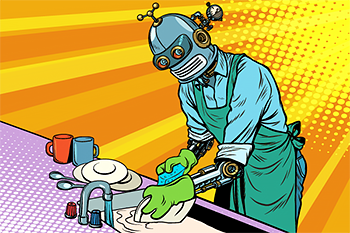 “As machines become cheaper to build and artificial intelligence technology becomes more comprehensive and affordable, many industries are going to become robot-centric,” says Rob Wilson, expert in the field. “Just look at the automotive industry: Starting in the 1980s, companies were spending billions of dollars to create robots to perform basic tasks in their automobile factories. Now, 43 percent of the world’s robots are used by the automotive industry. We should expect to see a similar trend in manufacturing as well, although the good news is that robots create jobs in some fields even as they take them away in others.”
“As machines become cheaper to build and artificial intelligence technology becomes more comprehensive and affordable, many industries are going to become robot-centric,” says Rob Wilson, expert in the field. “Just look at the automotive industry: Starting in the 1980s, companies were spending billions of dollars to create robots to perform basic tasks in their automobile factories. Now, 43 percent of the world’s robots are used by the automotive industry. We should expect to see a similar trend in manufacturing as well, although the good news is that robots create jobs in some fields even as they take them away in others.”
Wilson cautions that battles over minimum wage could increase the application of artificial intelligence in some industries, especially as it relates to entry-level, unskilled work.
“Findings show that fast-food workers could be at serious risk of losing their jobs to robots in the next several years. One study found that each new robot added per 1,000 workers causes wages to drop in the surrounding area by around 0.25 and 0.5 percent,” says Wilson. “We can clearly see that in specific industries, the impact of automation can not only impact job numbers, but also a worker’s wages.”
For more on this topic, please contact Rob Wilson at rwilson@thewilsoncompanies.com.
